Spartacus Blog
Mikhail Koltsov and Boris Efimov - Political Idealism and Survival
Thursday, 3rd March, 2016

Mikhail Fridlyand, the son of a Jewish shoemaker in Kiev, was born in Russia on 31st May, 1898. His brother, Boris Fridlyand, was born two years later. As teenagers, inspired by the oratory of Leon Trotsky, they both became Bolsheviks. This was a dangerous thing to do in 1916 and both men took new names: Mikhail Koltsov and Boris Efimov.
Both men were members of the Red Army that beat the White Army in the Russian Civil War. (1) On their return to Moscow they became important figure in the creation of a communist media in the Soviet Union. Koltsov worked for Pravda and helped to establish Krokodil and Efimov, a talented cartoonist, contributed to these journals. (2)
Koltsov and Efimov were both supporters of what became known as the Workers' Opposition. The leaders of this group were Alexandra Kollantai (Commissar for Welfare) and Alexander Shlyapnikov (Commissar for Labour). Kollantai published a pamphlet The Workers' Opposition, where she called for members of the party to be allowed to discuss policy issues and for more political freedom for trade unionists. She also advocated that before the government attempts to "rid Soviet institutions of the bureaucracy that lurks within them, the Party must first rid itself of its own bureaucracy." (3)
The group also published a statement on 27th February, 1921: "A complete change is necessary in the policies of the government. First of all, the workers and peasants need freedom. They don't want to live by the decrees of the Bolsheviks; they want to control their own destinies. Comrades, preserve revolutionary order! Determinedly and in an organized manner demand: liberation of all arrested Socialists and non-partisan working-men; abolition of martial law; freedom of speech, press and assembly for all who labour." (4)
At the Tenth Party Congress in 1922, Lenin proposed a resolution that would ban all factions within the party. He argued that factions within the party were "harmful" and encouraged rebellions such as the Kronstadt Rising. The Party Congress agreed with Lenin and the Workers' Opposition was dissolved. (5) Koltsov and Efimov, remained reformers and were members of what became known as the Left Opposition. (6)
After the death of Lenin, Mikhail Koltsov became a close associate of Joseph Stalin and was described as "the confidant and mouthpiece and direct agent of Stalin". It has been claimed that with the help of Stalin he became one of the most important journalists in the Soviet Union. (7) It has been argued that "if Pravda featured a readable piece in the 1930s, Koltsov was probably the author". Although he was always willing to give his support to Stalin he was seen as unreliable as "in his writing he could be bitingly satirical". (8)
Efimov was also close to Stalin. He later admitted that he produced propaganda on behalf of the communist government. "In my opinion, propaganda appeared together with Soviet power, after the October revolt. Before I think people didn't even know the meaning of the word. People knew it existed, but it didn't have such a wide meaning or scope... Sometimes propaganda suggested something correct and fair, and sometimes suggested something completely absurd, inhuman, against nature. But the strength of propaganda always overcame. People started to believe in something." (9)
Foreign politicians were often the target of Boris Efimov's wit. "Among those who felt his artistic wrath were bourgeois capitalists, Italian fascists, and anti-Soviet British politicians". In 1927 Austen Chamberlain, the British Foreign Minister, formally complained to Soviet authorities about a cartoon that ridiculed his policies. (10)
The problem for the two brothers was that they remained good friends with Leon Trotsky. It has been pointed out that when in "1929, Trotsky was to be deported from the Soviet Union, Boris visited him to say goodbye. Although he did this as secretly as possible, Stalin found out and remarkably took no action. For anyone else it would have been a death sentence but Boris's cartoons were obviously a vital propaganda tool to the regime. This would not be the first time, Boris was saved by his talent to draw." (11)
To survive the purges, both men were extremely loyal to Stalin. In 1933 Koltsov published a book where he attempted to justify the methods used by Stalin to deal with counter-revolutionaries. "To do this work we need really honest, really unselfish, really reliable communist revolutionaries. We have them, and those whom the Party and the Soviet State have appointed to other posts must never forget the services rendered by these men... Over the champagne glasses, mercenaries and spies, assassins and frauds, provocateurs and gamblers are being given their instructions - to destroy the Soviet rule." (12)
In 1936 Koltsov was sent to cover the Spanish Civil War. It was reported that in January 1937, Koltsov, commanded a section of Russian tanks in the battles of Pozuelo de Alarcón and Aravaca. Although some historians have considered this an exaggeration, he did send a "steady stream of long and vividly written articles back to Russia". (13)
While in Spain he met Ernest Hemingway. The two men became close friends and Koltsov was the model for the character Karkov in his novel For Whom the Bell Tolls. (14) Hemingway described him as "the most intelligent man he had ever met... with a spitting way of talking through his bad teeth, he looked comic.... but he had more brains and more inner dignity and outer insolence and humour than anybody he had ever known". (15)
Claud Cockburn, a British journalist, was also impressed with Koltsov: "I spent a great deal of my time in the company of Mikhail Koltsov, who then was Foreign Editor of Pravda... He was a stocky little Jew from Odessa - with a huge head and one of the most expressive faces of any man I ever met. What his face principally expressed was a kind of enthusiastically gleeful amusement - and a lively hope that you and everyone else would, however depressing the circumstances, do your best to make things more amusing still. He had a savagely satirical tongue - and an attitude of entire ruthlessness towards people he thought either incompetent or even just pompous. People who did not know him well - particularly non-Russians - thought his conversation, his sharply pointed Jewish jokes, his derisive comments on all kinds of Sacred Cows, unbearably cynical." (16)
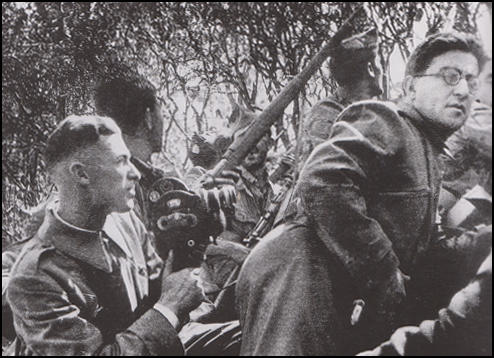
Mikhail Koltsov developed a reputation for being a womanizer. Sefton Delmer recorded that he always turned up on the front-line "with one or more of his train of women. He would have with him either his wife, a neurotic-looking ex-ballerina, or Comrade Bola, an enormous cheerful peasant who was his secretary assistant, or Maria Osten, a blond vivacious gamine of a young German Communist." (17)
In 1937 Efimov, as the cartoonist working for Isvestia, covered the Show Trials and accused people such as Nikolay Bukharin and Leon Trotsky of being traitors of the revolution. During this period Efimov compliantly drew vicious political cartoons against those he had previously so admired within the Soviet leadership. Kevin McNeer points out that "his drawings during the infamous Show Trials of the 30s, when Efimov published vicious political cartoons against his friends, including Bukharin and Trotsky, depicting them as Nazis and spies when he knew the accusations against them were false." (18)
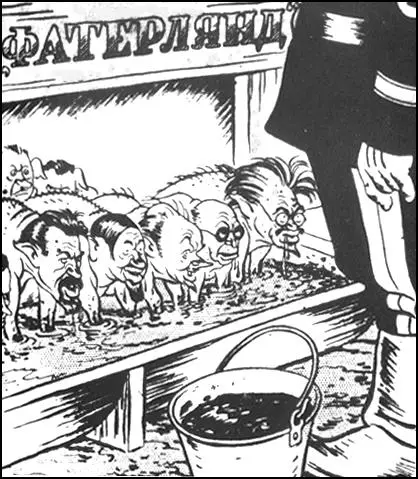
Alexei Rykov, Victor Chernov, Nickolai Bukharin, Alexei Rykov and Leon Trotsky.
Efimov justified his work as his role in convincing people of the merits of communism: "The question of whether people believed in something positive, despite these terrible hideous atrocities that were going on in the country, I would say that they wanted to believe. Because to not believe, you know, is already the end of a person. A person has to believe in something, has to have some kind of hope, or it is already the end of him. So they wanted to believe that this was happening by chance, only now and again, that everything would be all right." (19)
Efimov remained loyal to Joseph Stalin and portrayed his rivals as "enemies of the people". (20) Efimov later defended his actions during this period. "What was I supposed to say when I heard with my own ears how he confessed that he was a traitor, a turncoat, an enemy of Soviet power? It was a complicated time. Now it’s fine to criticize. I am not Giordano Bruno to burn at the stake on a matter of principle. I knew that if I said, ‘No, I won’t!’ I would end up in the very same place. My family, my wife would be killed. I recall those cartoons with aggravation, with shame, with disappointment, but I couldn’t have acted differently then." (21)
Efimov claimed that his brother remained loyal to Stalin. "He (Mikhail Koltsov) believed deeply, honestly - and I am not afraid to say this - almost fanatically in Stalin's wisdom. My brother often told me in detail of his encounters with Stalin, of his mannerisms in conversation, his remarks, turns of phrase and his jokes. He loved everything about Stalin." However, Koltsov gradually began to have doubts about Stalin's behaviour: "I think and I think but I can't understand anything. What is going on? How did it turn out that we suddenly have so many enemies? These are people that we've known for years, that we lived with cheek-by-jowl for years! Army commanders, Civil War heroes, party veterans! And for some reason, no sooner have they disappeared behind bars than they immediately confess that they are enemies of the people, spies, agents of foreign intelligence services. What's going on? I think I'm going out of my mind." (22)
On 19th December, 1937, Mikhail Koltsov published an article criticizing some aspects of the purges. Koltsov claimed that to protect themselves, some people had smeared the innocent and called on the party, the government, the courts and public opinion to put a stop to such "heartless liars who violated the rights of Soviet citizens". (23)
Koltsov told his brother that he was in danger as his name had been put on a death list produced by Nikolai Yezhov. Like others he was "still at liberty and at work, who had in fact already been condemned and annihilated by one stroke of this red pencil... Yezhov was left with merely the technical details - working up the cases and producing the orders for arrest." (24)
Mikhail Koltsov was arrested on 12th December, 1938. Simon Sebag Montefiore, the author of Stalin: The Court of the Red Tsar (2003) claims that the main reason was that Stalin was determined to arrest all of his representatives that had spent time in Spain during the civil war. For example, Vladimir Antonov-Ovseenko, who had been the Soviet Ambassador to Madrid, was arrested at the same time. (25)
Donald Rayfield, the author of Stalin and his Hangmen (2004) puts forward another theory. When the secret police arrested Mikhail Prezent, a journalist friend of Koltsov, they discovered his diary. It showed that Prezent was a supporter of Leon Trotsky, who was described as the "last intelligent man in politics". Prezent's diary also implied that Koltsov was a supporter of Trotsky. It also included comments by Koltsov about Stalin's uncouth habits. (26)
Other historians, such as Marc Jansen, believes his affair with Yevgenia Feinberg, the wife of Nikolai Yezhov, the head of the NKVD, was an important factor in his arrest. It is believed that Yezhov added Koltsov's name to the 346 "enemies of the people" marked for execution. (27) Another historian has discovered information that Andre Marty, who served with Koltsov in Spain, contacted Stalin and accused him of being a "Trotskyist". (28)
Koltsov was accused of being the leader of a network of spies that included Walter Krivitsky, Alexander Orlov, Ilya Ehrenburg, Isaac Babel, Boris Pasternak, Maria Osten, Andre Malraux, Maxim Litvinov, Evgeni Gnedin and Vsevolod Meyerhold. Koltsov was tortured by Lavrenty Beria and according to Alexander Fadeyev he eventually admitted to working with the French and German intelligence agencies. Koltsov was tried before Vasiliy Ulrikh on 1st February, 1940. He retracted all his confessions but was found guilty and shot that night. (29)
Boris Efimov also expected to be arrested and executed: "I prepared myself for my own arrest, since I was as guilty as he. But it never happened. I was left in freedom; I was left alive, and I continued to work. Not straight away, for roughly a year and a half, I was unemployed. They threw me out of the newspapers and magazines where I worked, because I was already known as the brother of an enemy of the people. But then something strange and inexplicable happened. At the same time that my brother's case ended, and he was executed, I was asked to go back to work. It was some gruesome kind of reckoning I don't know what. I could have refused... I did not have the right to do that, because you can direct your own fate, your freedom, your own life, but I had my parents, our parents. I had a wife; I had a young son. If I had done that, they would all have died. So I went back to work." (30)
At the time Efimov was expected to produce work in favour of the Nazi-Soviet Pact and to express hostility towards Britain and the United States. In 1940 he produced Blood and Business. "Drawn at a time when the Nazi-Soviet Pact was still very much in force. Using a skull abacus, Uncle Sam keeps a tally of his war profits as the news from Europe is announced on the radio." (31)
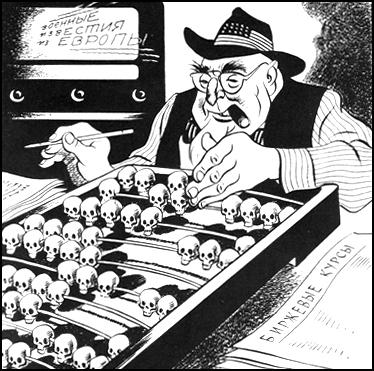
On 21st June, 1941, Adolf Hitler launched Operation Barbarossa. The country was now at war with Nazi Germany. The first few months of the war was disastrous for the Soviet Union. The German northern forces surrounded Leningrad while the centre group made steady progress towards Moscow. German forces had also made deep inroads into the Ukraine.
Joseph Stalin ordered the Soviet people to fight the advancing German troops: "The Red Army, the Red Navy, and all citizens of the Soviet Union must defend every inch of Soviet soil, must fight to the last drop of blood for our towns and villages, must display the daring, initiative and mental alertness characteristic of our people. In case of forced retreat of Red Army units, all rolling stock must be evacuated, the enemy must not be left a single engine, a single railway truck, not a single pound of grain or gallon of fuel. Collective farmers must drive off all their cattle and turn over their grain to the safe keeping of the state authorities, for transportation to the rear. lf valuable property that cannot be withdrawn, must be destroyed without fail. In areas occupied by the enemy, partisan units, mounted and on foot, must be formed; sabotage groups must be organized to combat enemy units, to foment partisan warfare everywhere, blow up bridges and roads, damage telephone and telegraph lines, set fire to forests, stores and transport. In occupied regions conditions must be made unbearable for the enemy and all his accomplices. They must be hounded and annihilated at every step, and all their measures frustrated." (32)
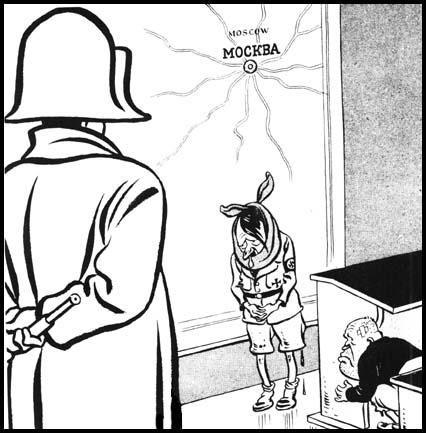
Boris Efimov's contribution to the defence of the Soviet Union was to produce a series of anti-Hitler cartoons. This included The History Lesson (1941). As Mark Bryant, the author of World War II in Cartoons (1982) pointed out: "Boris Efimov... has the cold and snivelling schoolboy Hitler overshadowed by schoolmaster Napoleon (who was in reality a very small man), while Mussolini, whose scars bear witness to an earlier 'history lesson,' cowers in fear." (33) Hitler was upset by this and other cartoons and gave orders for Efimov to be executed when his troops captured Moscow. (34)
After the war Joseph Stalin used Boris Efimov as a weapon in the Cold War. He later recalled in an interview with PBS: "When the war finished, and our allies stopped being our allies, there was created a situation where we started to depict them as a kind of enemy, as aggressors.... But that was the politics of the Soviet Union at the time. The same was true of the politics of the West. We portrayed Churchill and Truman as aggressors and warmongers, and the West portrayed Stalin and Molotov as aggressors and warmongers as well.... If you need an example here is one: I was often impressed by Churchill, by his will, by his wonderful oratory talent, his jokes. I really liked him. And then it was announced that he was our enemy, and we had to draw cartoons about him, and when I drew him looking in the mirror and seeing a reflection of Hitler, that was, for me, not convincing and not pleasant. I realized that Hitler was a real Fascist enemy, and that Churchill was a big government figure. I understood that this was not true, and I didn't believe it in my heart, in my soul, but that was government policy, and it was a situation against which I could not act." (35)
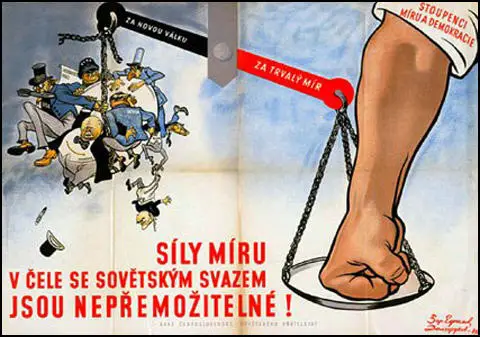
After the death of Joseph Stalin, Efimov remained a supporter of his sponser: "He gave me my life and my work – how can I not be grateful for that?... He could have lifted his little finger, and we wouldn’t be having this conversation today.” (36)
As Tim Benson has pointed out: "By the 1960's, Boris personified Israel as a blood thirsty fascist client state of American imperialism. During the 1967 and 1973 wars, Efimov personified Israel as a burly, gun-toting aggressor. In some cartoons, the Star of David merges with a skull and crossbones and although he steered clear of Jewish physical stereotypes he did use Nazi imagery to associate it with Israel's actions. During the Six Day war, Boris even signed an official letter condemning Israel for its aggression towards the Arab states surrounding it. Boris later argued that his own anti-Israel cartoons needed to be seen as part of an international political context, and he viewed them as understandable at the time but was later ashamed of them." (37)
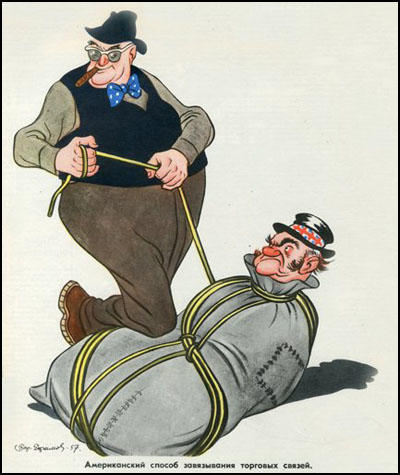
Boris Efimov was still alive when communism collapsed in the Soviet Union. He disliked the changes that followed: "Propaganda was born together with the Soviet regime in 1917, and through all 70 years of its existence, propaganda helped to consolidate society, held it in some kind of unified, strong community. And when the Soviet Union disappeared and propaganda disappeared with it, there was left a sort of emptiness." (38)
In 2005 Efimov gave an interview to the American film director, Kevin McNeer and asked him about his relationship with Stalin: "Boris and I would go back and forth about this as we filmed, and after one such session, he suddenly realized how bizarre what he was saying must have sounded to me. It was a striking moment of self awareness – he saw himself from my perspective, the perspective of a young American who couldn’t fathom what life in the Soviet Union in the 30s was like." (39)
Efimov continued to produce cartoons into his last years. On his 107th birthday he was given the title of chief cartoonist of Isvestia in recognition of 80 years work for the paper. (40) Later that year several Israeli newspapers reported that he was very likely the oldest living Jew and the last person left alive in the Russian Revolution. (41)
Boris Efimov died, aged 108, on 1st October, 2008. He lived more than 68 years longer than his brother. Both men were willing to compromise their ideals in order to keep alive. Mikhail Koltsov, like most of the leading Bolsheviks, failed in this task and did not live a long life. However, Stalin thought that Efimov's talents were so special, he could not afford to lose him.
References
(1) Paul Preston, We Saw Spain Die (2008) page 179
(2) Isobel Montgomery, The Guardian (4th October, 2008)
(3) Cathy Porter, Alexandra Kollontai: A Biography (1980) pages 326-27
(4) Workers' Opposition, statement (27th February, 1921)
(5) Isaac Deutscher, Stalin (1949) page 227
(6) Paul Preston, We Saw Spain Die (2008) page 193
(7) Claud Cockburn, A Discord of Trumpets (1956) page 304
(8) Donald Rayfield, Stalin and his Hangmen (2004) page 251
(9) Boris Efimov, interviewed on PBS (1999)
(10) Stephen Norris, Daily Telegraph (13th April, 2010)
(11) Tim Benson, Boris Efimov: Stalin's favourite cartoonist (2015)
(12) Mikhail Koltsov, The Man in Uniform (1933) pages 43-45
(13) Jonathan Haslam, The Soviet Union and the Struggle for Collective Security in Europe (1984) page 262
(14) Roman Karmen, No Pasaran! (1976) pages 272-278
(15) Douglas Martin, New York Times (4th October, 2008)
(16) Claud Cockburn, A Discord of Trumpets (1956) page 304
(17) Sefton Delmer, Trail Sinister (1961) page 387
(18) Kevin McNeer, Passport Magazine (June, 2009)
(19) Boris Efimov, interviewed on PBS (1999)
(20) Isobel Montgomery, The Guardian (4th October, 2008)
(21) Kevin McNeer, Passport Magazine (June, 2009)
(22) Roy Medvedev, Let History Judge: The Origins and Consequences of Stalinism (1971) page 402
(23) Mikhail Koltsov, Pravda (19th December, 1937)
(24) Robert Conquest, The Great Terror (1990) page 63
(25) Simon Sebag Montefiore, Stalin: The Court of the Red Tsar (2003) page 239
(26) Donald Rayfield, Stalin and his Hangmen (2004) page 251
(27) Marc Jansen, Stalin's Loyal Executioner (2002) page 185
(28) Paul Preston, We Saw Spain Die (2008) page 205
(29) Donald Rayfield, Stalin and his Hangmen (2004) pages 352-353
(30) Boris Efimov, interviewed on PBS (1999)
(31) Mark Bryant, World War II in Cartoons (1982) page 28
(32) Joseph Stalin, radio speech (June, 1941)
(33) Mark Bryant, World War II in Cartoons (1982) page 72
(34) Douglas Martin, New York Times (4th October, 2008)
(35) Boris Efimov, interviewed on PBS (1999)
(36) Kevin McNeer, Passport Magazine (June, 2009)
(37) Tim Benson, Boris Efimov: Stalin's favourite cartoonist (2015)
(38) Isobel Montgomery, The Guardian (4th October, 2008)
(39) Kevin McNeer, Passport Magazine (June, 2009)
(40) Isobel Montgomery, The Guardian (4th October, 2008)
(41) Douglas Martin, New York Times (4th October, 2008)
Previous Posts
Why the name Spartacus Educational? (23rd February, 2016)
Right-wing infiltration of the BBC (1st February, 2016)
Bert Trautmann, a committed Nazi who became a British hero (13th January, 2016)
Frank Foley, a Christian worth remembering at Christmas (24th December, 2015)
How did governments react to the Jewish Migration Crisis in December, 1938? (17th December, 2015)
Does going to war help the careers of politicians? (2nd December, 2015)
Art and Politics: The Work of John Heartfield (18th November, 2015)
The People we should be remembering on Remembrance Sunday (7th November, 2015)
Why Suffragette is a reactionary movie (21st October, 2015)
Volkswagen and Nazi Germany (1st October, 2015)
David Cameron's Trade Union Act and fascism in Europe (23rd September, 2015)
The problems of appearing in a BBC documentary (17th September, 2015)
Mary Tudor, the first Queen of England (12th September, 2015)
Jeremy Corbyn, the new Harold Wilson? (5th September, 2015)
Anne Boleyn in the history classroom (29th August, 2015)
Why the BBC and the Daily Mail ran a false story on anti-fascist campaigner, Cedric Belfrage (22nd August, 2015)
Women and Politics during the Reign of Henry VIII (14th July, 2015)
The Politics of Austerity (16th June, 2015)
Was Henry FitzRoy, the illegitimate son of Henry VIII, murdered? (31st May, 2015)
The long history of the Daily Mail campaigning against the interests of working people (7th May, 2015)
Nigel Farage would have been hung, drawn and quartered if he lived during the reign of Henry VIII (5th May, 2015)
Was social mobility greater under Henry VIII than it is under David Cameron? (29th April, 2015)
Why it is important to study the life and death of Margaret Cheyney in the history classroom (15th April, 2015)
Is Sir Thomas More one of the 10 worst Britons in History? (6th March, 2015)
Was Henry VIII as bad as Adolf Hitler and Joseph Stalin? (12th February, 2015)
The History of Freedom of Speech (13th January, 2015)
The Christmas Truce Football Game in 1914 (24th December, 2014)
The Anglocentric and Sexist misrepresentation of historical facts in The Imitation Game (2nd December, 2014)
The Secret Files of James Jesus Angleton (12th November, 2014)
Ben Bradlee and the Death of Mary Pinchot Meyer (29th October, 2014)
Yuri Nosenko and the Warren Report (15th October, 2014)
The KGB and Martin Luther King (2nd October, 2014)
The Death of Tomás Harris (24th September, 2014)
Simulations in the Classroom (1st September, 2014)
The KGB and the JFK Assassination (21st August, 2014)
West Ham United and the First World War (4th August, 2014)
The First World War and the War Propaganda Bureau (28th July, 2014)
Interpretations in History (8th July, 2014)
Alger Hiss was not framed by the FBI (17th June, 2014)
Google, Bing and Operation Mockingbird: Part 2 (14th June, 2014)
Google, Bing and Operation Mockingbird: The CIA and Search-Engine Results (10th June, 2014)
The Student as Teacher (7th June, 2014)
Is Wikipedia under the control of political extremists? (23rd May, 2014)
Why MI5 did not want you to know about Ernest Holloway Oldham (6th May, 2014)
The Strange Death of Lev Sedov (16th April, 2014)
Why we will never discover who killed John F. Kennedy (27th March, 2014)
The KGB planned to groom Michael Straight to become President of the United States (20th March, 2014)
The Allied Plot to Kill Lenin (7th March, 2014)
Was Rasputin murdered by MI6? (24th February 2014)
Winston Churchill and Chemical Weapons (11th February, 2014)
Pete Seeger and the Media (1st February 2014)
Should history teachers use Blackadder in the classroom? (15th January 2014)
Why did the intelligence services murder Dr. Stephen Ward? (8th January 2014)
Solomon Northup and 12 Years a Slave (4th January 2014)
The Angel of Auschwitz (6th December 2013)
The Death of John F. Kennedy (23rd November 2013)
Adolf Hitler and Women (22nd November 2013)
New Evidence in the Geli Raubal Case (10th November 2013)
Murder Cases in the Classroom (6th November 2013)
Major Truman Smith and the Funding of Adolf Hitler (4th November 2013)
Unity Mitford and Adolf Hitler (30th October 2013)
Claud Cockburn and his fight against Appeasement (26th October 2013)
The Strange Case of William Wiseman (21st October 2013)
Robert Vansittart's Spy Network (17th October 2013)
British Newspaper Reporting of Appeasement and Nazi Germany (14th October 2013)
Paul Dacre, The Daily Mail and Fascism (12th October 2013)
Wallis Simpson and Nazi Germany (11th October 2013)
The Activities of MI5 (9th October 2013)
The Right Club and the Second World War (6th October 2013)
What did Paul Dacre's father do in the war? (4th October 2013)
Ralph Miliband and Lord Rothermere (2nd October 2013)
